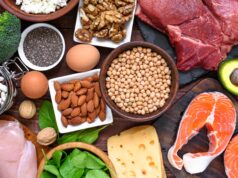The stomach is a very acidic environment which breaks down food and makes nutrients more available. However, the stomach has an even stronger acidity than gastric juice, so it can’t digest anything other than protein. To break down carbohydrates, proteins, and fats, the body uses enzymes that are produced by cells in the small intestine.
The food not digesting sitting in stomach is a question that has been asked for years. Scientists have finally found the answer to this age-old question.
Why does food remain in the stomach for such a long time before being permitted to move slowly into the small intestine? Answer 1: Before food enters your stomach, your teeth break it down to a smaller size, not only to make it easier to swallow, but also to add saliva to help it go down.
People often wonder how long food stays in the stomach.
| 50% of stomach contents were evacuated | 3 to 2.5 hours |
|---|---|
| The stomach is completely empty. | Approximately Approximately 4 to 5 hours |
| The small intestine is emptying 50% of the time. | 3 to 2.5 hours |
| Experiencing colon transit | 30 to 40 hours of work |
As a result, the issue is: how can I speed up the emptying of my stomach? Eating more frequent little meals Bloating may be relieved by increasing the number of regular meals while reducing the size of each one. In addition, the stomach may be able to empty more rapidly. To fulfill nutritional requirements, eat smaller quantities of food at each meal, which implies four to six meals each day.
How long does it take for your stomach to empty in this manner?
4 to 5 hours
What foods are the most difficult to digest?
Bacon, steak, lamb, whole milk hard cheese, and nuts are the foods that take the longest to digest. It takes your body approximately 4 hours to digest these meals on average. Even when sleeping, the digestive process continues.
Answers to Related Questions
Why do I have to defecate right after I eat?
Having to poop after every meal
The gastrocolic reflex is the body’s natural response to consuming food of various intensities. When food enters your stomach, various hormones are released. These hormones cause your colon to contract, allowing food to pass through it and out of your body. This frees up space for additional food.
When you eat pizza, how long does it remain in your stomach?
6-8 hours for a piece of pizza
The crust, sauce, and vegetable toppings are rich in carbohydrates, while the cheese and any meat toppings are high in fat and protein. The greater the fat content, the longer it takes to digest.
How can I get rid of the food in my stomach?
It’s best to use Himalayan salt or sea salt. If you drink water fast on an empty stomach, you’ll most likely feel the need to go to the toilet within a few minutes. Do this in the morning and evening, and be sure you spend some time at home near the restroom afterward.
When should you stop eating before going to bed?
According to a well-known nutritionist, you should eat your final major meal of the day at least 2 to 3 hours before bedtime. If you’re up until late at night and it’s been 4 to 5 hours since your last large meal, you may eat a little snack before going to bed.
What can I do to hasten my digestion?
If you’re worried about your travel time, there are several things you can do to make it go faster.
- Every day, exercise for 30 minutes. A sequence of muscular contractions moves food and digested substances through the body.
- Increase your fiber intake.
- Consume yogurt.
- Reduce your meat consumption.
- Drink a lot of water.
How can I speed up the emptying of my stomach?
Gastroparesis may be treated by avoiding high-fat foods, such as meat and dairy products, as well as junk food.
- Foods that are high in fat. Fats cause the stomach to take longer to empty.
- Foods high in fiber.
- Foods that are difficult to chew.
- Foods that are bad for you.
- Alcohol.
- Fruits and vegetables are healthy choices.
- Carbohydrates and starches are two types of carbohydrates.
- Meats, eggs, and dairy products are all good sources of protein.
What causes rumbling in the stomach?
Abdominal noises have a variety of causes. Food, beverages, digestive fluids, and air are all likely to be moving through your intestines when you hear abdominal noises. Your belly may grumble or growl when your intestines digest meals. The rumbling sound you experience after eating is usually caused by peristalsis.
An empty stomach is defined as a period of time without eating.
two hours
Do you defecate for a long time after eating?
Food passes through your stomach and small intestine in approximately six to eight hours after you eat. Food next reaches your large intestine (colon) for additional digestion, water absorption, and undigested food evacuation. Food takes approximately 36 hours to pass through the colon completely.
Is it OK to lay down after a meal?
After eating, do not lay down.
Our bodies are designed to digest meals when standing up, therefore sitting down while your body tries to digest food may cause indigestion. Before going to bed, wait 2-3 hours after a meal.
Is it OK to just eat once a day?
According to a 2007 research, eating just once a day raises blood pressure and cholesterol. So, even if you’re losing weight, if your one meal a day consists of overly processed fried foods or too many simple carbohydrates, you’ll feel fairly terrible. Feeling very hungry or binge eating are two more dangers of fasting.
When I haven’t eaten anything, why do I feel so full?
Early satiety is a sensation that may be accompanied with nausea, vomiting, bloating, or weight loss. Peptic ulcers and gastroesophageal reflux disease, often known as GERD, are two possible reasons of early satiety. A more severe issue, such as pancreatic cancer, may be a role in certain instances.
What is the best way to determine whether your stomach is empty?
Pay attention to your body’s cues to determine if you’re hungry or full.
- Hunger is a natural feeling that makes you desire to consume something. Your brain receives a signal from your body that your stomach is empty.
- The sensation of being pleased is known as fullness.
- Appetite is a desire for eating triggered by the sight, smell, or thought of food.
Is water beneficial to digestion?
There’s no need to worry about water diluting digestive fluids or interfering with digestion. Drinking water before, during, and after a meal may really help with digestion. Water and other liquids aid in the digestion of meals so that nutrients may be absorbed. Water also softens feces, which aids in constipation prevention.
Which side of the stomach empties first?
Heartburn is lessened.
According to researchers, while we sleep on our left side, the stomach and its gastric fluids stay lower than the esophagus.
What should I eat to get my stomach empty?
5 foods that help to cleanse the colon
- Broccoli. There are many methods to include broccoli into your diet.
- Greens that are dark and leafy. Colon cleansing may be accomplished by eating dark, leafy greens such as spinach, kale, and chard.
- Milk. Milk may be used for more than simply cereal in the morning.
- Raspberries.
- Oatmeal.
Is it true that Liquid counts as a full stomach?
If you need to take your medicine on an empty stomach, do so 2 hours before meals or 2 hours after your last meal, with a full glass of water (usually water). Some medicines should not be taken with milk, just as they should not be taken with meals.
Is it possible for food to remain in your stomach for days?
Food passes through your digestive system in 24 to 72 hours on average. The meal has passed through your stomach, small intestine, and large intestine in 6 to 8 hours. The partly digested components of your meal may linger in your large intestine for more than a day before being broken down even further.
Is walking beneficial to digestion?
A post-meal stroll has been proven to improve digestion in two separate trials. Walking speed up the pace at which food passed through the stomach, according to a 2008 research. Walking after a meal, in essence, clears glucose from the circulation, lowering blood sugar and allowing meals to pass through your system more quickly.
The food not digesting sitting in throat is a question that has been asked for a long time. There are many reasons why food might stay in the stomach, including the fact that it gets stuck and does not move.
Frequently Asked Questions
How long does food stay in the stomach?
Food in the stomach stays for a little over an hour.
What causes food to not digest?
Food that is not digested properly can cause a number of health problems. It can also be a sign of an underlying medical condition.
Related Tags
- how long does food stay in the small intestine
- what are the main causes of gastroparesis
- gastroparesis treatment
- diabetic gastroparesis
- food not digesting sitting in stomach home remedies



